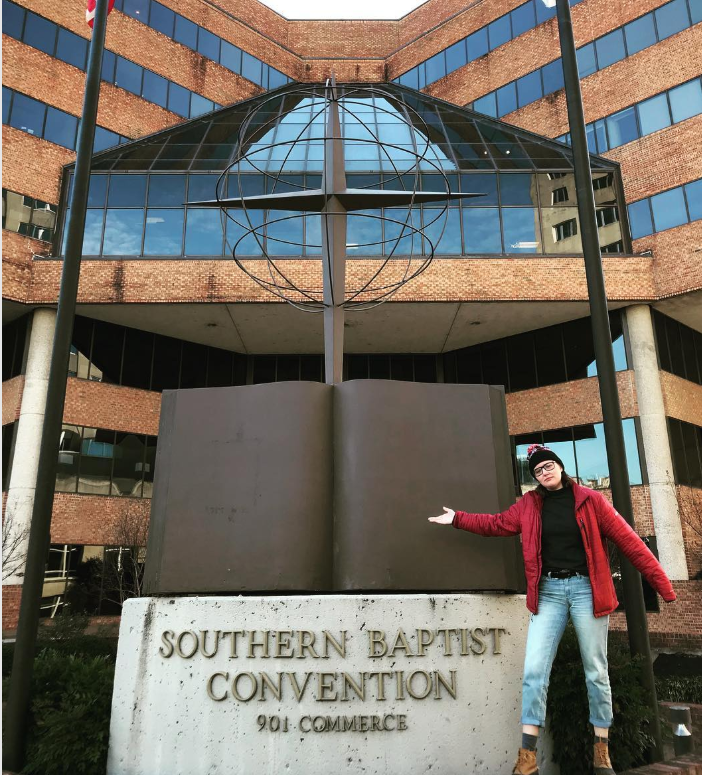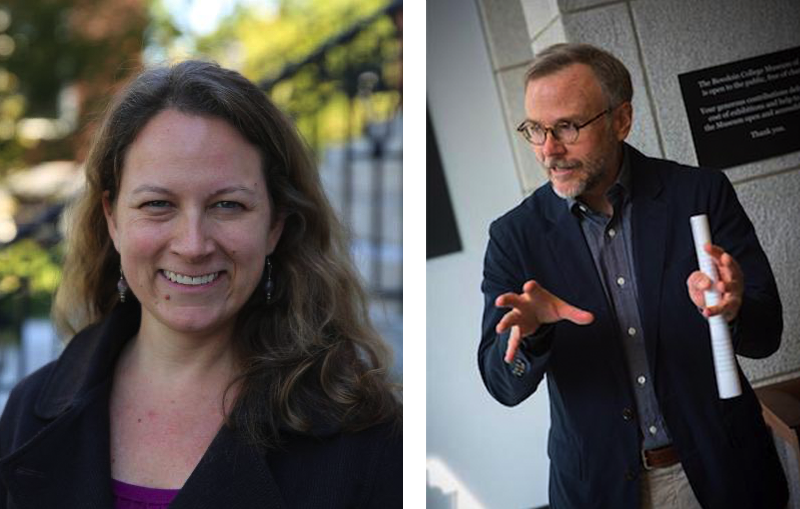A Senior's View of an Influential Christian Church
By Rebecca Goldfine
The Southern Baptist Convention is a US-based network of evangelical Christian churches and missions, with approximately ten million to fifteen million members. Because it is so large and has wielded considerable political clout, particularly with the Republican party, it has been a source of fascination for many scholars of religion, history, and politics.
Smith, a religion major and government minor, grew up attending a Southern Baptist church in Lexington, Kentucky, and still attends when she returns home.
She set out this year to pursue a new angle to the question of why the church left behind the more democratic, liberal values it espoused through the 1960s to become more conservative and patriarchal. While some scholars have identified political reasons for the transformation, Smith also identifies important theological considerations.
"I look at what happened with the Southern Baptist Convention in tandem with the neo-Calvinist movement," she said. "I'm looking at how it was legitimized through this theological framework."
Calvinism is an old theology that originated around the Reformation. It traditionally has not been popular in the US because its conception of an angry, sovereign God and its notions of humans as depraved sinners are a bit too severe for widespread adoption, Smith explained.
But neo-Calvinism, "an innovative doctrinal system" developed in the late twentieth century by American evangelicals, like John Piper, has evolved to appeal to modern audiences. But it has not left behind some of its absolutist doctrines, Smith said. She has found many areas of overlap between the Southern Baptist Convention and the neo-Calvinist movement.
"The Southern Baptist Convention . . . reinforces various theological things I associate with neo-Calvinism, like the doctrine of trinitarian subordinationism," she said. "That doctrine is not found anywhere else, and it means that the members of the trinity are inherently unequal and that the son submits to the father."
This doctrine, as well as the neo-Calvinist insistence of the divine as "male and father," has helped justify the Southern Baptists's insistence that its church leaders—who have been all men—are infallible, and that men naturally wield authority over women.
To modernize this retrograde idea, Smith argues that "neo-Calvinists have altered the understanding of power . . . to justify new doctrines such as 'complementarianism.'”
Complementarianism is the belief that while the sexes are equal, they have different roles and responsibilities in society. Smith suggests complementarianism does not actually entail true equality, that it is just gender subordination disguised in a way to make it more acceptable to women and younger generations.
"Insistence on the label 'complementarianism' on the part of both neo-Calvinists and the new generation of Southern Baptists is a strategic effort to discourage checks on power by making their ideology appear more moderate," she writes in her thesis.
Such power imbalances, particularly when they're justified with theology, leave in place power relationships that are ripe for abuse. In her thesis's final chapter, Smith looks at the way the #MeToo movement and sexual misconduct accusations have roiled the church, leading to the dismissal of longtime leaders.
A few of Sydney's favorite classes
Constitutional Law I and II, Maron Sorenson
The first semester examines the development of American constitutionalism, the power of judicial review, federalism, and the separation of powers. The second semester focuses on civil rights and liberties.
Christian Sexual Ethics, Elizabeth Pritchard
The class examines the historical development, denominational variety (e.g., Catholic, Evangelical, and Mormon), and contemporary relevance of Christian teachings and practices regarding sex and sexuality.
Modern Judaism and Islam, both with Robert Morrison
The class places developments in Jewish liturgy, thought, and identity within the context of Islamic civilization.
The Hebrew Bible in Its World, Kerry Sonia
The class requires close readings of the Hebrew Bible while studying Near Eastern religious, cultural, and historical contexts, giving emphasis to creation cosmologies, politics, and rituals. Attention is paid to the Old Testament's literary forerunners, from c. 4000 BCE onward, and to its successor, The Dead Sea Scrolls.
Again, Smith questions whether progress can actually take place when the foundation of the church is constructed on neo-Calvinist theology. "The way the new generation of leaders is going, they're denouncing people who've been accused of sexual abuse, and trying to put into place systems to combat these things," Smith said. "But I don't know if that is a genuine desire to fix the problem or a desire to make it seem like they're fixing the problem."
She argues, "It seems unlikely real change will occur without actual reformation of belief and practice, specifically the neo-Calvinist affinity for absolute power and gender subordination."



